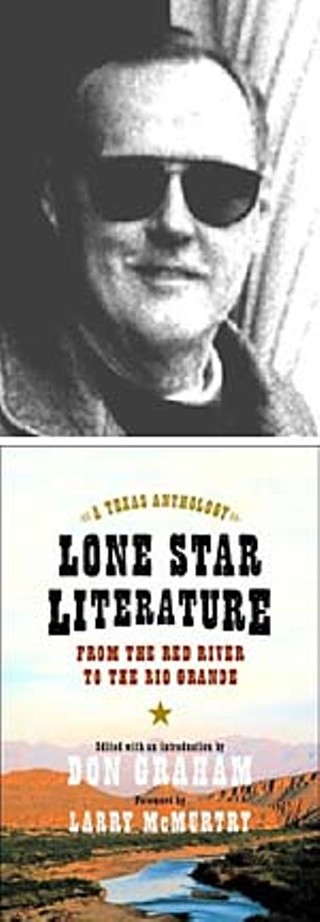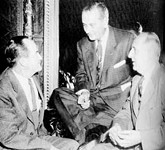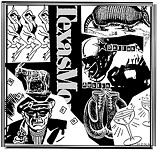2003 Texas Book Festival Preview
King of Texas: an interview with Don Graham, editor of 'Lone Star Literature'
By Dick Holland, Fri., Nov. 7, 2003

Lone Star Literature: From the Red River to the Rio Grande (Norton, $29.95) has been published just in time for the Texas Book Festival, where it will be a featured book on Saturday, Nov. 8. It is brought to us by the folks who produce all of the Norton anthologies, and has the same authoritative look to it. We recently caught up via e-mail with Don Graham -- UT professor and author of Kings of Texas and Giant Country -- who compiled the book and wrote the introduction.
AC: Your book has 63 selections, ranging from the cowboy writer Andy Adams to the Texas Jewboy, Kinky Friedman. When you were putting the book together, did you think in terms of compiling a "Texas canon," or were you more spontaneous in your selecting?
DG: I wasn't thinking about canon-formation, to use an English department-type term. I knew there were certain writers, particularly among the earlier ones in the century, that I wanted in the book. I knew, for example, that I wanted Gertrude Beasley, who up to now has been almost totally ignored and unread. The only way to read her work was to go to a research library. And then I wanted all the obvious choices: J. Frank Dobie, Katherine Anne Porter, Larry McMurtry, Sandra Cisneros, etc. I think I have just about all of the writers that one would think of in forming a canon, yes.
AC: I doubt if many readers would know about Gertrude Beasley, who published her memoir of growing up in West Texas 80 years ago. What is it about her work that speaks to you, and who else in the book might be a discovery to the casual student of Texas lit?
DG: Beasley's book My First Thirty Years was published in Paris [France] in 1925. H.L. Mencken liked it. So do I. Beasley just gives one of the best, most damning portraits there is of a pure-dee white trash family, and, again, in 1925(!), she speaks openly of childhood sexuality, of bestiality, of all the roiling libidos that Texas literature, for a long time, wasn't going to be able to address (or undress).
Other forgotten works that I was happy to bring to the attention of readers today include John Houghton Allen's Southwest, one of my favorites, a deeply ironic and lyrical account of life in South Texas. Although I have never been a big O. Henry fan, I really like the story selected for this volume, "Art and the Bronco." Also the cutting from J. Evetts Haley, which fans of Lonesome Dove will spot as a key influence upon the end of McMurtry's epic novel. All of the early stuff is great, I think, and among the more recent stories, if somebody has not read James Crumley's "Whores," they're in for a treat, provided they like good writing. I also thought it made a lot of sense to resurrect Aaron Latham's "Urban Cowboy" piece. Everybody has seen the movie, but nobody remembers the original. And so on.
AC:You've taught the Life and Literature of the Southwest class at UT for years -- is this book something you had thought about for some time?
DG: The book did, in a way, grow out of my course in Life and Literature of the Southwest, which I have taught for a long time now. In the beginning, in the late 1970s, I taught Western movies in the course, because that is what the department at that time wanted. Then I shifted to literature, mainly, and covered the entire West; then, finally, around the mid-1980s, I settled on Texas exclusively and argued, rightly or wrongly, that Texas is a microcosm of the West, the Southwest, and so that has been my focus for the past 15 years. What started me on the road toward this book was both the course and my steady involvement in selecting its texts and talking about them, and an article published in the British Economist magazine in 1998 in which the author, whose name was not given, rather grotesquely caricatured Texas literature and Texas literary taste in a cartoonish fashion. The anthology is something of an answer to a Yankee, a Brit, a European, whoever it might be, who insists upon seeing Texas as a backward bastion of redneckism. We have had and continue to have some very good writers in this state, and that's what the book tries to show.
AC: The book is organized pretty much by regions of the state (the border, the South, the West), and then the last part is urban Texas. How did this arrangement come to you, and does it help answer any of the old questions about Texas, like is it a southern place or a western place, etc.? Another way of saying this is: Does the structure of the book reflect something about the place or the writing from the place?
DG: The structure of the book derives from a scheme I have been using for a long time: dividing the state into geographical/cultural areas. There is plenty of precedent for this, going all the way back to the Articles of Annexation. I grew up northeast of Dallas, not all that far from where McMurtry grew up, by the way, west of Fort Worth -- but the cultures, the economies, were totally different. Walter Prescott Webb's piece in the book speaks to this point in a profound way. I like the geo-cultural organization because it frees me up from the prevailing ideology of English department studies at UT and around the country: namely, that everything should be drawn and quartered along the axis of race and gender. Oh, and I forgot post-colonialism. Myself, I'm a big believer in Texas as an empire. I think by all rights we should own Santa Fe and have some nice mountains in Colorado for skiing. But I realize this is probably a minority opinion. Had Mirabeau B. Lamar prevailed, we would have had those assets. ![]()
Don Graham and special guests will be on the "Lone Star Literature" panel at the Texas Book Festival, 2:45pm, Saturday, Nov. 8, in the Capitol auditorium.









